- Home
- Alison Kent
The Second Chance Café (A Hope Springs Novel Book 1) Page 28
The Second Chance Café (A Hope Springs Novel Book 1) Read online
Page 28
It had been a week since the fire had burned through the bedroom where she and Magoo had slept, yet walking the perimeter of the grounds this evening, Kaylie swore she could still feel the heat. It was all in her imagination, of course, but she thought it would be a long time before she could shake off the warmth. If not for her dog…
She dropped cross-legged to the ground near her garden, Magoo in front of her, panting as he waited for permission to roam. After a hug and a crinkle of her nose against his, she gave it, though reluctantly, and watched her knight in shining armor race through the underbrush awaiting the landscaper’s scythe.
Magoo would never know what he had given her. It was so much more than she could put into words, but since he was a dog, she didn’t have to. That made her smile. Then it made her laugh. And oh, it felt good to laugh, to fall to her back and look up at the sky, cut into blue puzzle pieces by the leaves of the trees. Closing her eyes, she listened to the sough of the branches overhead, the chatter of squirrels, Magoo’s bark in answer, the trills and the coos and the chirps of the birds…
“Kaylie?”
“Hmm?”
“Are you asleep?”
She opened one eye, then the other, and smiled up at the man standing over her. The man to whom she’d given her body and heart. “When did you get to be so tall?”
“When you lie down for a nap,” Ten said, crossing his legs and folding himself to the ground beside her, pulling her to sit when she reached out a hand. “I’m glad I stopped. I almost went straight home. I would’ve hated to have to drive back to wake you up.”
Until the insurance was settled and they knew exactly where they stood with the house, Ten, along with Will, had taken a short-term job in San Marcos. Kaylie missed having him around during the day. “I might’ve beaten you home if I hadn’t fallen asleep. But I learned my lesson.” She dug into her pocket for her phone. “See? And it’s even turned on.”
“Nice to see my threat worked.”
“Good guys don’t make threats.”
“Huh. Does that make me bad?”
“I don’t know,” she said, leaning toward him. “Let’s find out.”
Smiling, he cupped her cheek and brought his mouth to hers, his lips parting, his tongue sweet. She smiled, too, kissing him back, loving him back, until they were both grinning. Then she pulled away with a sigh, resting her head on his shoulder. “I haven’t mentioned this to Mitch, but I was thinking of changing my last name to Pepper.”
“I bet he’d love that,” Ten said.
She was so glad the two men in her life were becoming friends. “I feel so dumb having changed it to Flynn, but when I was five, Ernest was so good to me, like Santa Claus, with his white beard and big belly. I had no idea that he was more than a friend to my folks.”
“He was a friend to you when you needed one. Your taking his name is about that, not his relationship with your parents. From what you’ve said, it sounds like he loved you a lot.”
“I guess. But I think Kaylie Pepper sounds nice.”
“It does,” he said, reaching for her hand. “But not as nice as Kaylie Keller.”
She couldn’t say anything. She couldn’t even breathe. All she could do was stare at her hand in his, her fingers folded in his, his so much larger and so gentle and always so very sure.
“I love you, Kaylie. I want to spend the rest of my life with you. I don’t care if we do it here, or if we go to Austin, or if you want to start over in Nova Scotia. I want you to be my wife.”
“Oh, Ten,” she said, happiness bubbling up. “Nova Scotia is way too cold.”
“I know it’s out of the blue.” He ignored her comment and hurried on, as if afraid his proposal had frightened her, as if fearing her response was meant to laugh off what he’d said. “And I know you didn’t come to Hope Springs looking to complicate your life even further—”
“Tennessee Keller! You are not a complication.” She turned to him, took his face in her hands. “You could never be a complication. I love you, too. So very, very much. Don’t ever think otherwise. Promise me.”
“We don’t have to rush,” he told her. “In fact, we can wait as long as you want—”
“I don’t want to wait,” she said, and when he frowned, she reassured him. “I’ve put off too much of my life already, waiting on one thing or another while I figured out who I was and where I came from, what I wanted. I’m tired of waiting. I want everything now.”
“Don’t big weddings take a lot of time to plan?”
“Do you need a big wedding?”
“No, but I thought you would.”
She laughed, so happy she couldn’t stand it. “Maybe we do need to wait, since you don’t seem to know me at all.”
“I thought all women wanted big fancy weddings,” he said as he got to his feet.
She took his offered hand and let him pull her to hers. “No, but all women want their father to walk them down the aisle.”
“I think I know a guy who can do that.”
“You know a lot of guys,” she said, wrapping her arms around his neck.
He rested his forehead against hers. “It’s my job.”
“I thought that was being a man and knowing everything.”
“There is that. But there’s one thing I don’t know.”
“Which is?”
“Your answer.”
“What was the question again?” she asked, giddy and floating and in love.
Holding her hands in his, he dropped to one knee, his expression solemn and true. “Kaylie Flynn. I love you. Will you be mine?”
She already was, but she knew that wasn’t what he was waiting to hear. “Tennessee Keller. Nothing in the world would make me happier than being your wife.”
And from somewhere behind her, in one of the lot’s distant oaks, came the hoot of one owl, carried to her on the wind, and answered softly moments later by another.
ACKNOWLEDGMENTS
The Second Chance Café, aka Two Owls Café, is based on a restaurant that friends from work and I used to frequent. It was lunch only. There was a single entrée. And the honor-system cigar box did exist. Truth is stranger than fiction.
Thanks to Jill for her help with general contracting, Sheila for her help with craft fairs, and Sasha for his help with that thing he does in Round Rock. (And, yes, I’m being cagey so as to avoid spoilers.) Thanks to Bekke for the lavender oil and magnets, to Robyn for the photos, and for Maya.
Thanks to Megan F., Margaret M., Stephanie F., Helen-Kay D., Jill S., Laurie D., and Sarah W. for early reads as I shaped this story. (Apologies if I missed anyone; my brain is a sieve!) Once upon a time I had a critique group. Now I have the whole Internet.
Thanks to the professional chefs and hobbyist cooks for the wealth of recipe ideas I tweaked and adjusted for the Two Owls Café menu. Boy, the things I have learned about brownies!
I owe big hugs to Laura Bradford for finding Ten and Kaylie a home, to Lindsay Guzzardo for giving Ten and Kaylie that home, and to Tiffany Yates Martin for making Ten and Kaylie’s home a showpiece.
As always, thank you to Walt for your love and all that means. This time, too, for buying me a Mini, then driving me in it to Gruene, and lunch at the Gristmill, and cold water at Gruene Hall. You make every bit of the sweat worth it.
Read on for a sneak peek of Alison Kent’s next heartwarming romance
Beneath the Patchwork Moon
Available September 2013 on Amazon.com
The house sat forlorn as it had for ten years, mourning the family who had left it abandoned. Luna Meadows missed them, too. Day in and day out, beneath moonlight and sunlight, from behind painful scars. She missed them with more longing than she’d felt for anything else in the whole of her twenty-eight years. She missed them as if they’d been her own. In many ways, they had been.
Sitting on the hood of her car, a photo of the friend who’d lived here pressed between her palms, she strained to hear the voices that had once filled the r
ooms inside. With her eyes closed, she pictured the four youngest Caffey children running circles around the legs of the two older, the parents of the six siblings laughing the loudest of all. Yet Luna had only the memories. The sounds had turned to silence, and sadness was all that remained.
Sierra Caffey’s family had been one of the joys of being the girl’s best friend. She and Luna had bonded their first week as high school freshmen, Sierra new to the private school Luna had attended all along. Even the accident that had stolen Sierra days into their senior year hadn’t diminished the connection. Luna had kept her friend close for a decade, bearing the burden of a truth Sierra had taken to her grave.
It was a truth no one needed to know.
It was a truth no one else did.
Pushing off her car, she walked up the pebbled path to the porch where the swing still hung from ceiling chains, where the two big rockers and the table between had weathered to the gray of old age. The lawn, in the past always verdant, was dried to straw, and littered with leaves and acorns left to rot. The dark wood of the structure, the brown of burnt umber, was a victim of creeping moss and clinging mold and ground cover crawling above its station.
The Caffeys had lived on five acres at the far edge of Hope Springs, Texas. Sierra’s mother had belonged to many of the same craft guilds as Luna’s. But while Julietta Meadows spun and dyed wool for weaving, at first her own and then later, after the accident that had taken Sierra’s life, Luna’s, Carlita Caffey had been known for the precision of her quilts’ tiny stitches, as well as the intricate tops patched together as if the fabrics had always been one.
Not a single night had passed with Luna sleeping under this roof when the mother of the Caffey brood hadn’t spent the evening with a quilt hoop in her lap. Luna knew this because she’d helped Sierra and Teresa and Isidora clean the kitchen after supper, sneaking peeks at their mother, who’d kept her head down, her eyes on her needle. In the same way Luna’s mother had taught her about weaving, working silently as Luna watched her shuttle fly, Sierra’s mother had shown Luna how to patch together stories with colors and patterns and pieces of cloth while never saying a word.
Her key ring in her hand, Luna searched out the one that fit the front door and let herself into the house. The interior was dark and stale, the living room lit only by the beams of light able to cut through the shade trees and the windows smeared with the dirt of time. The lamps had long since gone dark. There were no bursts of illumination shining into the hallway from beneath closed bedroom doors, no glow from the kitchen as Angelo, the oldest Caffey child, stood in front of the open refrigerator searching for something to eat.
Angelo. Angel. Luna’s first love. A one-sided love, but no less true, and her heart no less broken for his indifference. While Sierra had attended the St. Thomas School on a music scholarship, Angelo had played quarterback for the Hope Springs Bulldogs. For two years, Luna hadn’t missed a game, begging rides from her father to those across town, even those across the state during play-offs. Harry Meadows loved his football, and loved pretending that his daughter loved it, too. Doing so made it easier for him to ignore the fact that she had eyes for only one player and no interest in the game.
Losing Sierra had been devastating, but losing Angelo to college, and later to the family’s move from Hope Springs, had crushed her. It shouldn’t have. They had nothing in common but his sister. He knew of her longing, of that she was self-consciously certain, but he was two years older and his social circle rich with friends from his much larger school. Luna and Sierra had a smaller circle, fewer friends, making the bond they shared vital to both.
It was going to be hard to see this house destroyed, Luna mused, regret tightening her chest as she walked from the living room into the dreary kitchen. But the structure wasn’t large enough to accommodate the new education center planned for the site, a center designed to fill the void left by funding cuts to the school district’s arts program.
Where other potential buyers had failed, the local nonprofit behind the venture had convinced the Caffeys to sell the property. The Arts of Hope Springs planned to name the center in honor of the Caffeys’ daughter and Oscar Gatlin, the boy who’d suffered a traumatic brain injury in the accident that had claimed Sierra’s life. Of course neither family had any idea Luna was the one who’d established the nonprofit, or whose idea it was to build the Caffey Gatlin Academy.
Funny how it had taken a perfect storm of events for her to decide to do more with her life than weave the scarves that had made her a minor fashion star and a major amount of money. The last four months had been so busy, in fact, that she’d done almost no weaving at all, and that wasn’t good. She needed to get back to the projects she’d started for the center’s initial fund-raising auction, but first things first. Today was about finding the box of Sierra’s things she’d come here for.
Sierra had hidden it as well as her larger secrets, entrusting Luna with those but never sharing what she’d done with the box. Luna had looked for it from time to time, checking the most obvious places, but never with the urgency now driving her. Knowing what was inside, she couldn’t let it fall into someone else’s hands, and construction was just weeks from breaking ground.
She tucked Sierra’s photo into her back pocket, tucked her keys into her front, gathered up her hair and knotted it at her nape. She doubted a search of the kitchen would be worth her time, but pulled a chair toward the refrigerator anyway, no stone left unturned and all that. Stepping onto the seat, she opened the first of the highest cabinets, wishing for a flashlight as she reached around inside. She’d definitely bring one next time.
And there would be a next time, and a next, and probably a next. The rambling two-story farm house was so big it had nooks and crannies in its nooks and crannies. A thorough search would take days, if not weeks—something she should’ve considered sooner, having been here so often in the past. From now on she’d come prepared, she mused, and then she went still, cocking her head at the sound of footsteps climbing the steps to the back porch.
She didn’t need permission to be inside. She was, essentially, the owner now. But few people knew that. No one knew she was here, and no one else had reason to be. She eased from the chair, her second foot touching the floor as the kitchen door opened into the room and a man moved to fill the entrance. He stood still as he took her in, not threatening, but waiting, as if she wasn’t who he’d expected to find. His face was shadowed, his body large, and her heart thundered in her chest and her ears.
She thought she’d seen knives in the block beside the stove, but not wanting to lose the advantage of surprise, reached into her pocket instead. Just as she wrapped her hand around her key ring, the keys jutting from between her closed fingers like spikes, he stepped over the threshold, ducking beneath the door’s facing, then straightening to stand. The light he’d been blocking followed him in.
In that moment, recognition dawned, and her stomach tumbled to the floor, unraveling toward him like a spool of thread. “Angelo?”
“Hello, Luna,” he said, his voice deep and sure and aged like fine wine.
After all these years. She swallowed around the lump in her throat and drank him in. His black hair was long, brushed away from his face, his strong jaw darkened with several days’ growth of beard. His nose was blade-straight and narrow, his lips pulled into a smirk and beautifully full. His body wore ten years of use that showed on his arms in muscles and scars. His hands were a mess of healed cuts.
“I didn’t know anyone was here,” she said, ignoring the urge to go to him, to hold him, to touch him, to feel him along with her past. “You scared me.”
“Wouldn’t want that now, would we?” He closed the door, shutting out what light had been shining through. Shutting them in the room that was full of old pain and Sierra and that very sad silence.
She wanted him to reach back and fling the door open. She wanted him not to know how nervous she was. She wanted to ask him a thousand questions. She wa
nted him to leave. She wanted him to stay forever. “What are you doing here?”
“No, baby,” he said, stepping closer to where she stood, and smelling of sunshine and sawdust and madness. “My house. I ask the questions.”
ABOUT THE AUTHOR
Photo by Robyn Arouty
Alison Kent is the author of more than fifty published works, including her debut novel, Call Me, which she sold live on CBS’s 48 Hours, in an episode called “Isn’t It Romantic?” Her novels A Long, Hard Ride and Striptease were both finalists for the Romantic Times Reviewer’s Choice Award, while The Beach Alibi was honored by the national Quill Awards and No Limits was selected by Cosmopolitan as a Red Hot Read. The author of The Complete Idiot’s Guide to Writing Erotic Romance and a veteran blogger, Alison decided long ago that if there’s a better career than writing, she doesn’t want to know about it. She lives in her native Texas with her geologist husband and a passel of pets.

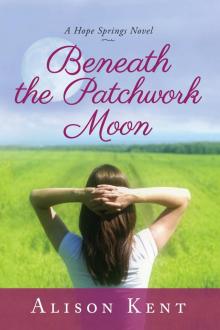 Beneath the Patchwork Moon (A Hope Springs Novel Book 2)
Beneath the Patchwork Moon (A Hope Springs Novel Book 2)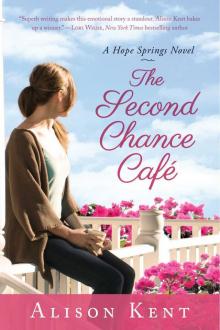 The Second Chance Café (A Hope Springs Novel Book 1)
The Second Chance Café (A Hope Springs Novel Book 1)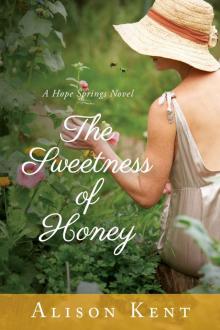 The Sweetness of Honey (A Hope Springs Novel Book 3)
The Sweetness of Honey (A Hope Springs Novel Book 3) The You I've Come To Know (A Mother's Love Book 1)
The You I've Come To Know (A Mother's Love Book 1) The You I'll Love Forever
The You I'll Love Forever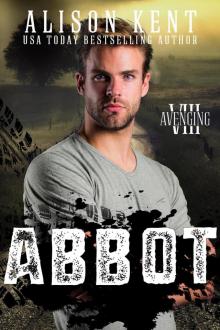 Abbot
Abbot The You I Want For Life (A Mother's Love Book 2)
The You I Want For Life (A Mother's Love Book 2) The You I've Come to Know
The You I've Come to Know The Comfort of Favorite Things (A Hope Springs Novel Book 5)
The Comfort of Favorite Things (A Hope Springs Novel Book 5) The You I Want for Life
The You I Want for Life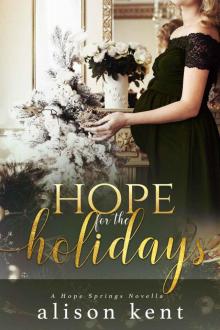 Hope for the Holidays: a Christmas novella (A Hope Springs Novel Book 6)
Hope for the Holidays: a Christmas novella (A Hope Springs Novel Book 6) Bliss and the Art of Forever (A Hope Springs Novel Book 4)
Bliss and the Art of Forever (A Hope Springs Novel Book 4) Play Me (Barnes Brothers Book 2)
Play Me (Barnes Brothers Book 2)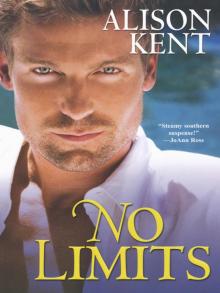 No Limits
No Limits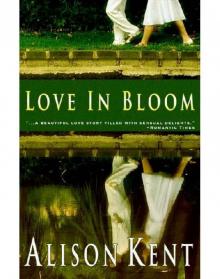 Love in Bloom
Love in Bloom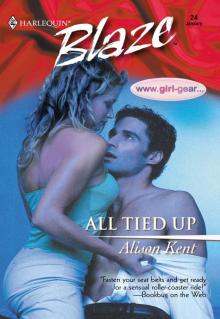 All Tied Up
All Tied Up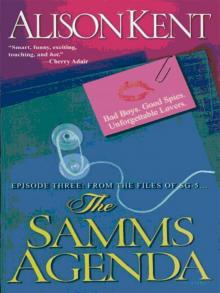 The Samms Agenda
The Samms Agenda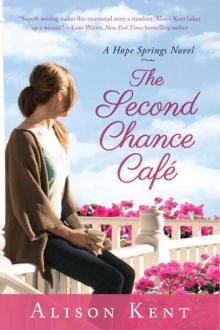 The Second Chance Café
The Second Chance Café One-Click Buy: March 2009 Harlequin Blaze
One-Click Buy: March 2009 Harlequin Blaze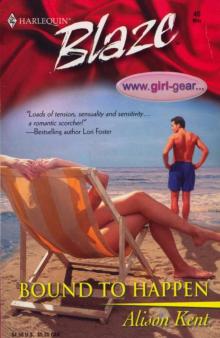 BOUND TO HAPPEN
BOUND TO HAPPEN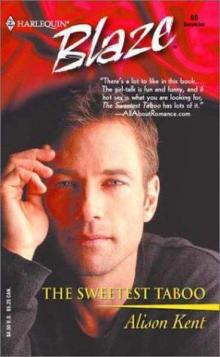 The Sweetest Taboo
The Sweetest Taboo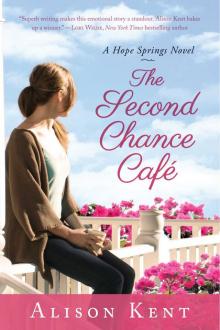 The Second Chance Café (A Hope Springs Novel)
The Second Chance Café (A Hope Springs Novel)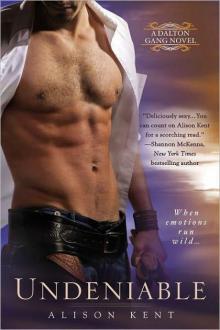 Undeniable
Undeniable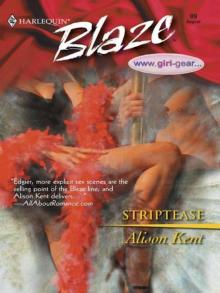 Striptease
Striptease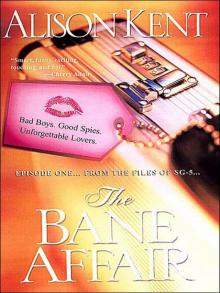 The Bane Affair
The Bane Affair At His Mercy
At His Mercy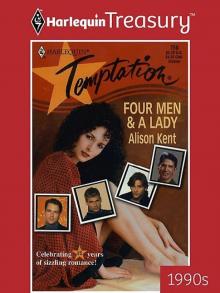 Four Men & A Lady
Four Men & A Lady The Comfort of Favorite Things (A Hope Springs Novel)
The Comfort of Favorite Things (A Hope Springs Novel)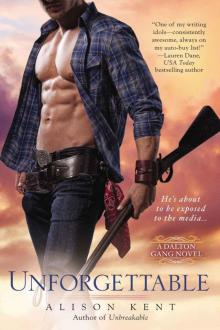 Unforgettable (The Dalton Gang #3)
Unforgettable (The Dalton Gang #3)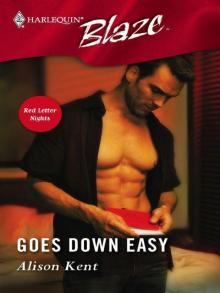 Goes down easy: Roped into romance
Goes down easy: Roped into romance Holiday Kisses: A Rare GiftMistletoe and MargaritasIt's Not Christmas Without YouThis Time Next Year
Holiday Kisses: A Rare GiftMistletoe and MargaritasIt's Not Christmas Without YouThis Time Next Year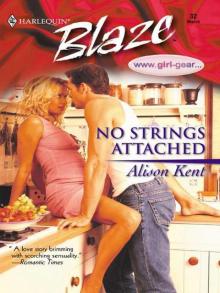 No strings attached
No strings attached Playing Love's Odds (A Classic Sexy Romantic Suspense)
Playing Love's Odds (A Classic Sexy Romantic Suspense)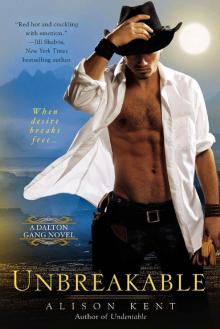 Unbreakable
Unbreakable Red Hot Holiday Bundle
Red Hot Holiday Bundle Kiss & Makeup
Kiss & Makeup The Shaughnessey Accord
The Shaughnessey Accord Larger Than Life
Larger Than Life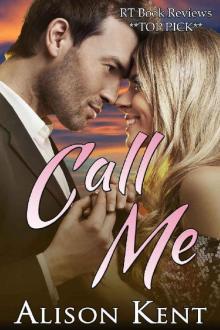 Call Me: sold live on CBS 48 Hours (Barnes Brothers Book 1)
Call Me: sold live on CBS 48 Hours (Barnes Brothers Book 1) With Extreme Pleasure
With Extreme Pleasure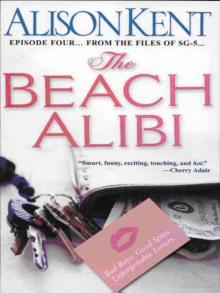 The Beach Alibi
The Beach Alibi Indiscreet
Indiscreet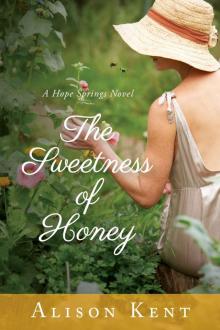 The Sweetness of Honey (A Hope Springs Novel)
The Sweetness of Honey (A Hope Springs Novel)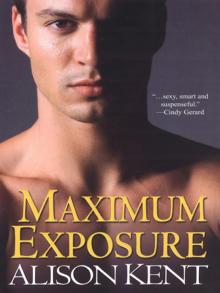 Maximum Exposure
Maximum Exposure